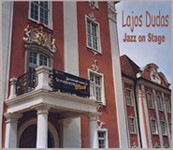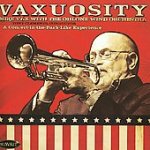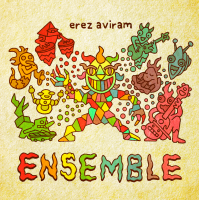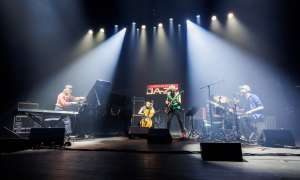Home » Jazz Articles » Live From New York » December 2008
December 2008
Although not officially a member of the Association for the Advancement of Creative Musicians, trombonist Alfred Patterson rightly earned a place in the organization's fall series through a long relationship with co-founder Muhal Richard Abrams. He opened his Nov. 14th brass quintet concert at The Community Church of New York with an encompassing unaccompanied solo, playing tight but never repeating lines through his mighty double-bell horn, creating a long paragraph of broken phrases, splintered but cogent. At length he came to a three-note motif that cued the Ebony Brass Quintet—French horn, tuba, two trumpets—plus drums into sweet yet still fragmented melodies broken finally by Joe Daley's walking bass tuba line and a taut Newman Taylor-Baker snare-and-drum shuffle. Patterson's five compositions, including a dedication to Langston Hughes and a piece using Malcolm X speeches as text, rang closer to his time with the New Jersey Symphony than with the Duke Ellington Orchestra; it wasn't until well into the second half that the bright tones usually associated with jazz trombone were heard. Patterson's reading on "Malcolm 6365" showed him to be a strong orator as well as a smart composer. He didn't try to duplicate the fire of the original, but still stayed closer to sermon than poem or recitation. Patterson, long an unsung trombone hero, in this rare leading appearance, showed himself to be an intelligent, sensitive composer as well.
Mostly Other People Do The Killing
The thing that makes Mostly Other People Do the Killing such an exciting band to watch is that they are a quartet of individuals, which is to say that they are both four and one, as a great band should be. Outside the quartet, the individual work of Moppa Elliott, Peter Evans, Jon Irabagon and Kevin Shea is extremely varied; inside they are, well, inside, in the hard bop pocket, but each immediately is ready to back the others' proclivities. That flexibility was shown in full on Nov. 1st when the band played a release party at Zebulon for their new This Is Our Moosic (Hot Cup). They drifted behind Irabagon's psychedelic sax soloing and broke into staggered, cutting rhythms underneath Evans' jet-engine trumpeting, which presumably wouldn't have had a place in the Jazz Messengers band but worked so smoothly as to defy logic or genre on Elliott's "Effort, Patience, Diligence," one of the pieces from the new record they played for the packed house. The other members stepped aside, however, for Shea's auto-erotic introduction to "A Night in Tunisia," a song the band has made its own in a way both respectful and undermining. But they are not only genre defiers; they clearly love the roots they cite, from Dizzy Gillespie and Art Blakey to Ornette Coleman. They are modern, but not ironic, serious but not formalist. They wore suits. They drank whiskey. They swung, but where swings customarily go back and forth, Mostly Other People Do the Killing go in and out of tradition.
—Kurt Gottschalk
Charlie Haden Liberation Music Orchestra
It was the perfect occasion to experience Charlie Haden's Liberation Music Orchestra: Election Night, Nov. 4th, 2008. The horn section, including three saxophones, two trumpets, trombone, French horn and tuba, all performed without microphones, separated from the electrified rhythm section players by plastic sound baffles, creating an intimate acoustic ambiance. The arrangements featured interlinked contrapuntal lines, lush chorale textures and a variety of grooves, including the reggae-fied "This Is Not America," all enhanced by strong soloing from the band. Tenor saxophonist Chris Cheek and guitarist Steve Cardenas both took fine turns on "Blue Anthem," trumpeter Michael Rodriguez was subtle and articulate over his ballad feature "Goin' Home" that also featured a dynamic cameo by alto saxophonist Loren Stillman, and pianist Alan Broadbent took interesting liberties with his introduction to "America the Beautiful". As the set progressed, Haden kept asking the audience for election updates and, when word came through around 11 pm that Senator Obama had enough votes to ensure a victory, he counted off a rousing rendition of "Amazing Grace" featuring himself on the melody, Curtis Fowlkes' inspired trombone solo and a heartfelt "amen" coda. The following medley of "America the Beautiful," "Lift Every Voice and Sing" and Ornette Coleman's "Skies of America" seemed to encapsulate the idea of 'freedom'—social, political and musical—on this historic night.
Django Reinhardt New York Festival
Nov. 8th marked the midpoint of the three-day, ninth annual Django Reinhardt New York Festival at Birdland. The spirit of the Belgian gypsy guitarist was alive and well, incarnate in the fine guitar playing of Samson Schmitt, Kruno Spisic, Evan Perri and Schmitt's younger brother Jean Baptiste (aka Bronson), backed by the propulsive bass of Brian Torff, with additional support from accordionist Ludovic Beier, violinist Timbo Mehrstein and tenor saxophonist Joel Frahm. The Hot Club of Detroit kicked off the late set with a swinging rendition of "Belleville," featuring leader Perri's tensile lines, Julien Labro's button accordion and Carl Cafagna's exciting soprano sax. The Hot Club's closer, "Blues Up and Down," contained a ferocious but friendly tenor battle between Cafagna and guesting Joel Frahm that had the audience laughing out loud. The second half was dominated by the dazzling (if somewhat over-amplified) elder Schmitt. His long-winded, chop-laden solo over "Night and Day" was relentless; elsewhere he comped in an aggressive, Django-esque style, but was at his peak over the sped-up outro of "Oh, Lady Be Good". Spisic sang "Ako Me Ne Volis" in a romantic baritone, played tremolo-driven solos on "I Can't Give You Anything But Love" and "Oh, Lady Be Good" and matched Samson Schmitt note for note on a faithful rendition of Reinhardt's recorded version of "Dark Eyes". Beier proved an apt foil to the guitars' thunder, a marvel of taste and technique.
—Tom Greenland
Robert Dick
50 Years of Flute! was the charming title of Robert Dick's Nov. 6th appearance at Carnegie Hall's intimate small room Weill Hall. And it was not hyperbole; Dick, one of the flute's most compelling innovators and charming emissaries, was celebrating 50 years (and two days) since he took his first breaths on a flute at eight years old. In the subsequent five decades, he has drastically expanded the sounds the flute—whether it be a concert flute or the massive contrabass edition—can make and the roles in which it can be found. Many of those innovations were on display at the concert, five unaccompanied works, including a world premiere, and a duet suite with pianist/partner Ursel Schlicht. From the onset of "Flames Must Not Encircle Sides" (1980), Dick demonstrated that his extended techniques—circular breathing, multiphonics, percussive effects—were not merely for virtuosic show but instead serve the melodic arc of his composing. Polyphony played a central role in "Piece in Gamelan Style" (1978) and Dick's flute with glissando headjoint, described in terms of a guitar's whammy bar, made "Sliding Life Blues" (2001) a possibility. A new work, "Air is the Heaviest Metal," continued Dick's explorations into music not commonly found for the instrument, in this case the work of Metallica (with subtle nods to Jethro Tull). The closing "Life Concert" (1997) with Schlicht placed Dick in a more traditional role, one he was happy to subvert at first chance.
Anat Fort
The final segment of pianist Anat Fort's Nov. 14th Rubin Museum concert was inspired by Milarepa, the 11th-12th century Tibetan yogi who supposedly composed 1,000 songs. Stimulated by this prolificacy, Fort wrote not one, but three pieces, which she played in trio with longtime bassist Gary Wang and drummer Paul Motian. Milarepa might have prompted the specific suite, but it was jazz yogi Motian that propelled the set. The drummer figured prominently on Fort's ECM debut A Long Story and much of the evening's 75 minutes was drawn from that album, such as the limpidly gorgeous "Morning: Good," the rambunctious "Not a Perfect Storm" and the crisp Golan Heights wine of "Just Now". But given Motian's schedule and distaste for travel, the pair have had little chance to play together since the recording. The results, rather than being bogged down with rust, benefited from the layoff. Motian is probably the most instinctive drummer in jazz and his rhythms functioned as a second melodic line to Fort's, creating an interesting dilemma for Wang—who to follow? He chose to inhabit the spaces both left behind and the music opened up into long, exploratory versions that seemed more like spontaneous composition than soloing over forms. Even an older piece like "Fire Drill Blues," which initially sounded out of place, blossomed in its exposition. The room's excellent acoustics only emphasized the non-hierarchical, three-dimensional nature of the group.
—Andrey Henkin
Jenny Scheinman
Versatile violinist Jenny Scheinman, who has earned an impressive reputation for her work with a vast variety of artists—from Bill Frisell and Vinicius Cantuária to Norah Jones and Ani DiFranco— performed as a leader at Village Vanguard last month, fronting a new quartet with pianist Jason Moran, bassist Greg Cohen and drummer Rudy Royston, whose individual talents were particularly well-suited to interpreting her intriguingly idiosyncratic music. By the final night of the weeklong engagement (Nov. 1st) the band was seamlessly meshing in a manner that blurred roles of soloist and accompanist, giving each piece a multifaceted character that translated the leader's distinctive compositions into appealing narratives. The set, comprised predominantly of material from Scheinman's latest release Crossing The Field (Koch), opened with a new piece "Chiralee". It began with the violinist plucking a repeated three-note figure with Cohen's arco bass underpinning supplying a supple context for Moran's piano that took up Scheinman's introductory progression as she began bowing the song's main theme. Throughout the evening the players seemed to be particularly in tune to the context surrounding their improvisations, with each solo flowing logically from the previous one while still moving in unexpected directions. Scheinman's compositions (and her interpretation of Ellington's "Awful Sad") revealed that rare ability to translate everyday life into new music.
Myron Walden
Myron Walden, well known for his contributions on alto sax and bass clarinet to Brian Blade's Fellowship, the New Jazz Composers Octet and Jason Lindner's Big Band, let the spotlight shine strictly on his soulful tenor playing at The Jazz Gallery (Nov. 8th) where he unveiled his new band Country Fried, a down-home organ trio with Pascal Leboeuf on the house Hammond B-3 and Chris Brown behind the drums. The Florida-born reedman spoke of his "country" roots and the desire to expose some of his "hidden influences" with new music written for the group that reflected the popular sounds he heard growing up down South. From the opening notes of his "I Can't Do No More," a slow easy-grooving gospel-inflected original, it became obvious that the saxophonist's primary influence on the tenor was none other than the too often neglected Stanley Turrentine. (Later in the set Walden confirmed the notion, inviting the full house to a Monday night gig at Smalls with his band Stanley, a group devoted to the music of the late horn man.) Throughout the set of original music the leader emulated Turrentine's restrained intensity, laying back in mid-tempo grooves, building dynamics through the use of register changes and tonal variations, rather than the honking hysterics often associated with the genre. The young Leboeuf, a recent Bay Area transplant, handled the B-3's keys and pedals with assurance and Brown's drumming moved around the pocket nicely, serving Walden well.
—Russ Musto
Recommended New Listening:
* Bad Touch—Vol. 1: Like a Magic Kiss (s/r)
* Bill Carrothers—Home Row (Pirouet)
* Sean Conly—Re:Action (Clean Feed)
* James Moody/Hank Jones Quartet—Our Delight (IPO)
* William Parker Quartet—Petit Oiseau (AUM Fidelity)
* Angelica Sanchez—Life Between (Clean Feed)
—David Adler NY@Night Columnist, AllAboutJazz.com
* Isotope—Golden Section (Cuneiform)
* Jeff Johnson—Tall Stranger (Origin)
* Jim McAuley—The Ultimate Frog (Drip Audio)
* Larry Ochs/Miya Masaoka/Peggy Lee—Spiller Alley (Rogue Art)
* Bucky Pizzarelli and Strings—So Hard to Forget (Arbors)
* Sonny Rollins—Roadshows, Vol. 1 (Emarcy-Doxy)
—Laurence Donohue-Greene Managing Editor, AllAboutJazz-New York
* Tine Asmundsen/Richard Davis/Vidar Johansen/Robert Shy—Madison (Hazel Jazz)
* Henriette Groth/Lotte Anker—DuFugl (ILK)
* Devin Hoff—Solo Bass (s/r)
* Briggan Krauss' H-Alpha—Red Sphere (Skirl)
* Tony Malaby Cello Trio—Warblepeck (Songlines)
* The Misled Children—Meet Odean Pope (Porter)
* The Thing—Now and Forever (Boxed Set) (Smalltown Superjazz)
—Andrey Henkin Editorial Director, AllAboutJazz-New York
Tags
PREVIOUS / NEXT
Support All About Jazz
 All About Jazz has been a pillar of jazz since 1995, championing it as an art form and, more importantly, supporting the musicians who make it. Our enduring commitment has made "AAJ" one of the most culturally important websites of its kind, read by hundreds of thousands of fans, musicians and industry figures every month.
All About Jazz has been a pillar of jazz since 1995, championing it as an art form and, more importantly, supporting the musicians who make it. Our enduring commitment has made "AAJ" one of the most culturally important websites of its kind, read by hundreds of thousands of fans, musicians and industry figures every month.





























